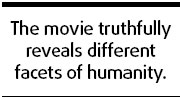More to war movie than meets the eye
Updated: 2008-01-15 07:19
All major cinemas in China have been showing director Feng Xiaogang's latest blockbuster Assembly - a drama about war and closure from the 1940s to the present.

The film has attracted much attention from the Chinese film industry for its depiction of heroic deeds. Many filmgoers have left theaters with tears rolling down their cheeks, a phenomenon rarely seen in the country in recent years.
What should we make of Assembly as we bid 2007 adieu and enter 2008?
War-themed feature films have been a staple of Chinese cinema, especially since the founding of the People's Republic (October 1, 1949). And there is a reason for such a large number of them being made over the years - a strong political demand. However, this author feels it is not a good enough reason if we only focus on politics. The Chinese society maintains a historical and psychological craving for war dramas.
Looking at this phenomenon from an historical point of view, it shows the Chinese viewing public wants to accord the nation's struggles in the past century, a cultural recognition through the most accessible medium - the cinema. From the psychological point of view, Assembly represents an artistic attempt to carry on a tradition born of the humiliations the nation has suffered as a weakling for decades before the founding of the People's Republic.
If we see Assembly only as an effort to carry on a tradition, we would be ignoring the creative work of the screenwriters as well as misinterpreting and misunderstanding what the tradition means. As a matter of fact, Assembly owes its box-office success to daring experiments that have turned out to be a success - the script, acting, production design, pyrotechnics, and sound recording, to name a few.
It is safe to say Assembly is not so much a return to heroism as a proactive response to the diverse values existing in today's market-oriented economy. In an effort to keep a tradition alive Assembly is transcendental and innovative. But what is the source of this?
This writer believes the source is first of all the liberation of the mind and affirmation of humanity, as well as humanism in artistic composition. Shackled by damning criticism of the cruelty of war to humanity as "capitalist sentiments" for decades and especially during the "cultural revolution" (1966-76), few if any of China's military-themed feature films made in those days ventured into such taboo territories. The creation of such movies stepped back into reality only after the start of economic reforms and opening up as heroes regained their human traits, an ordinary man on the street can relate to.
Assembly is able to truthfully reveal both sides of a paradox and different facets of humanity. That is why it can connect with audiences with a story of the past none of them has experienced.
The film also owes its success to the learning experience of Chinese artists from their foreign colleagues. It is common knowledge the cultivation and development of the theme of an art film is impossible without innovative ways of expression. In Assembly, Chinese viewers can see clearly what the creative minds behind it have learned or borrowed from foreign productions. From the camera angles to the use of special effects, we are repeatedly reminded of battle scenes in this movie of such Hollywood classics as Saving Private Ryan and The Longest Day, including cinematic cliches like a scene suddenly shaken by an explosion.
If one finds the pyrotechnics in Assembly are just as good as those used in Taegukgi (a South Korean blockbuster also known as Brotherhood or Brotherhood of War), he or she should not be surprised because the special effects team consisted of key members of Taegukgi.
There is also an extremely important, or dare I say the most important factor behind the phenomenal success of Assembly: a new awakening of Chinese scriptwriters and directors. After years of trial and error as Chinese cinema turned onto the market-oriented highway, more and more professionals working in the industry realized that the largest, ultimate and most solid market in terms of box-office earnings in China thrives on national conditions and popular sentiments.
In this regard, China has an excellent ethnic culture and psychological tradition, which is a combination of realism and romanticism, which people exude as they pursue truth, virtue, beauty, and heroism.
For sure this movie is not without flaws (hard-to-miss traces of imitation for instance), so much so it has failed to win director Feng an award despite its popularity. Nevertheless, we can believe Chinese cinema will blossom as long as the creative minds remain free, always remember people first, and never treat humanity and humanism lightly.
Life is full of difficulties. The only way to beat the odds is through bravery and friendship, both among the eternal themes of war movies. This is why so many people love to watch war movies in times of peace.
The author is a researcher with China Foundation for International and Strategic Studies
(China Daily 01/15/2008 page8)
|
|
|
|
|
|